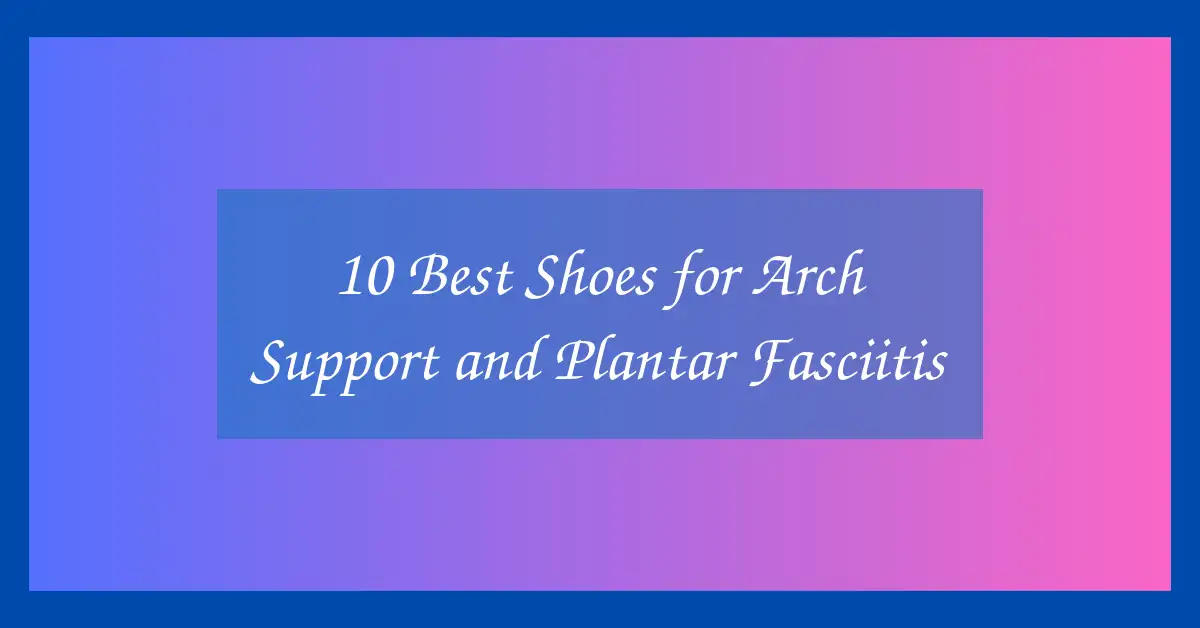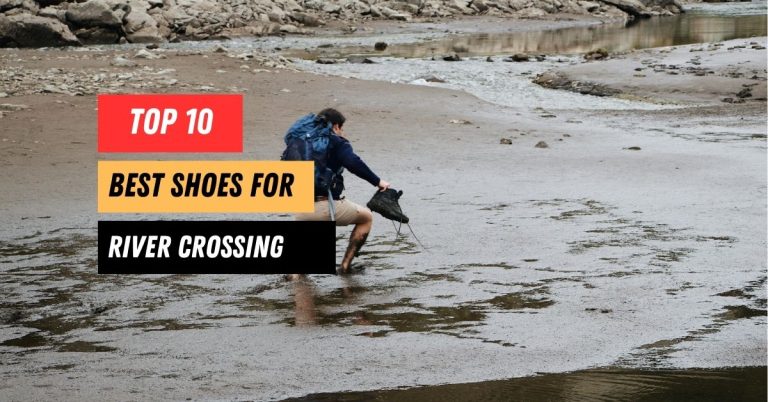10 Best Shoes for Arch Support and Plantar Fasciitis
Finding the right shoes for arch support and plantar fasciitis isn’t just about comfort it’s essential for reducing pain, preventing injury, and improving mobility. Plantar fasciitis, a common foot condition characterized by heel pain and inflammation of the plantar fascia ligament, can worsen with improper footwear. Similarly, individuals with high or flat arches often experience strain or discomfort that the right shoes can help alleviate. Footwear designed with strong arch support, proper cushioning, and heel stability can relieve pressure on the fascia and enhance natural foot alignment. Whether you’re walking, running, or standing all day, the right pair of shoes makes a world of difference. In this article, we’ll explore what to look for in supportive shoes, how to choose the best pair, and address frequently asked questions to help you step confidently toward relief.
Best Shoes for Arch Support and Plantar Fasciitis
Table of Contents
Toggle1. Brooks Addiction Walker 2
The Brooks Addiction Walker 2 is a top choice for individuals seeking excellent arch support and relief from plantar fasciitis pain. Designed with motion control and extended progressive diagonal rollbar (PDRB) technology, this shoe helps align your body naturally and reduce foot strain. The full-grain leather upper offers durability, while a slip-resistant outsole provides grip on various surfaces, making it suitable for long walks or work environments.
What stands out is the BioMoGo DNA midsole cushioning that adapts to your stride, minimizing impact on the heel and arch. The shoe is firm yet responsive, offering that critical balance needed for foot stability. While it has a slightly heavier build, it compensates with long-term comfort and support. The wide base also enhances stability, a key factor for those with overpronation.
The Brooks Addiction Walker 2 also accommodates orthotics thanks to its removable insole. Available in multiple widths, it suits users with narrow to extra-wide feet. Its structured fit may feel snug at first, but it molds well over time. Though it leans more toward utility than style, its performance justifies its loyal following among those with chronic foot pain.
Pros:
-
Excellent arch and heel support
-
Slip-resistant outsole for all-day use
-
Durable leather upper
-
Orthotic-friendly with removable insoles
-
Multiple width options available
Cons:
-
Heavier than most walking shoes
-
Limited style and color variety
2. HOKA Bondi 8
The HOKA Bondi 8 is a max-cushioned running shoe that doubles as a superb everyday walking and standing solution for those with plantar fasciitis. Known for its plush cushioning and shock absorption, this shoe is built with HOKA’s signature EVA midsole and a rear crash pad to ease transitions and reduce heel impact. Its oversized sole doesn’t just look bold—it provides a stable, supportive platform ideal for high arches or heel pain.
The shoe features a breathable mesh upper and an extended heel geometry that improves gait mechanics. Unlike some cushioned shoes, the Bondi 8 maintains a firm structure to avoid excessive foot motion. Users often report a noticeable decrease in foot fatigue, especially after long hours of wear.
Though primarily designed for runners, its balance of softness and control makes it popular among teachers, nurses, and anyone on their feet all day. It’s orthotic-friendly and provides enough toe room for natural splay, even for wide feet. While its chunky silhouette might not appeal to everyone, the support it delivers makes it a standout choice for pain relief.
Pros:
-
Outstanding cushioning and shock absorption
-
Stable platform ideal for plantar fasciitis
-
Orthotic-compatible
-
Wide toe box and multiple size options
-
Breathable and lightweight mesh upper
Cons:
-
Bulky appearance may not suit all tastes
-
Premium price point
3. ASICS Gel-Kayano 30
ASICS Gel-Kayano 30 is a high-performance stability shoe that offers targeted support for those with flat feet, overpronation, or plantar fasciitis. Built with ASICS’ 4D Guidance System, it enhances foot alignment and reduces strain on the plantar fascia during movement. The Gel-Kayano 30 uses FF BLAST™ PLUS ECO cushioning and PureGEL™ technology to provide soft landings while maintaining responsiveness.
The engineered mesh upper ensures breathability and reduces hot spots. A deep heel cup stabilizes the rearfoot, helping to prevent excessive movement that can worsen plantar pain. Despite its performance-focus, the Gel-Kayano offers everyday comfort and is available in several stylish designs and widths.
Whether walking or running, it consistently supports proper foot mechanics. Many users appreciate the blend of bounce and control, which eases pressure off the heel and arch. The shoe also comes with a removable insole to accommodate custom orthotics. Though not the lightest option, it remains a trusted pick for those needing all-around foot protection.
Pros:
-
Advanced stability features for overpronation
-
Excellent heel and arch cushioning
-
Sleek, breathable design
-
Removable insole for orthotic use
-
Ideal for daily walking or running
Cons:
-
Slightly heavier than neutral trainers
-
Break-in period may be needed
4. Vionic Walker Classic
Vionic is known for merging orthotic science with everyday style, and the Vionic Walker Classic is a strong example. It offers podiatrist-designed arch support and a biomechanical footbed that reduces overpronation and heel pressure. Designed for walking and standing, this shoe uses an EVA midsole for shock absorption and a thermoplastic heel counter to add rearfoot stability.
What makes this model unique is its seamless blend of support and comfort for both casual and clinical settings. The firm arch and deep heel cup cradle the foot and promote a natural gait. Its full-grain leather upper adds durability, while the padded collar and tongue enhance the overall comfort experience.
The Walker Classic is also APMA (American Podiatric Medical Association) approved, adding a layer of trust for people with plantar fasciitis. Though slightly dated in appearance compared to modern athletic shoes, it outperforms many in its class when it comes to pain relief and support.
Pros:
-
Built-in orthotic arch support
-
Deep heel cup for rearfoot stability
-
Durable leather upper
-
Certified by podiatrists (APMA-approved)
-
Ideal for walking and daily use
Cons:
-
Outdated aesthetic
-
Not as breathable as mesh alternatives
5. New Balance 1540v3
Engineered for maximum support and motion control, the New Balance 1540v3 is tailored for people who need structure and stability due to plantar fasciitis or flat arches. It features a dual-density ENCAP midsole and Rollbar posting system to limit rearfoot movement and reduce stress on the plantar ligament. It’s one of the most supportive shoes available on the market.
The synthetic mesh upper keeps the foot cool while maintaining structural integrity. A wide platform base offers excellent balance and accommodates orthotics with ease. Despite its orthopedic-level support, it provides a comfortable ride even during extended wear.
This shoe is ideal for walkers, workers, or runners needing significant motion control. It’s available in multiple widths, making it suitable for wider feet. While the design is more function-focused than fashion-forward, its performance in pain relief and stability is highly praised.
Pros:
-
Superior motion control and arch support
-
Wide base enhances stability
-
ENCAP midsole cushions and supports
-
Breathable upper with durable construction
-
Excellent for flat feet and overpronation
Cons:
-
Bulky design
-
Pricey compared to standard trainers
6. Orthofeet Coral Stretch Knit
Orthofeet Coral Stretch Knit shoes are a go-to for individuals with sensitive feet, plantar fasciitis, or arch issues. Engineered specifically for foot health, these shoes offer premium orthotic insoles with anatomical arch support and multiple cushioning layers to reduce pressure on the heel and ball of the foot. The stretchable upper material adapts to swelling and irregular foot shapes, which is ideal for people with bunions or diabetes.
The lightweight, ergonomic sole features air cushioning and a mild rocker design that facilitates a smoother walking motion. The shoe’s orthotic-friendly construction includes a wide toe box, removable insoles, and adjustable depth to accommodate custom orthotics. Additionally, it includes extra foam padding throughout to enhance comfort.
Though more of a therapeutic shoe than a fashion sneaker, the Coral still presents a modern aesthetic. Its construction is APMA-accepted and backed by podiatrists. People recovering from foot pain often describe immediate relief after wearing these shoes, especially when worn throughout the day.
Pros:
-
Premium orthotic insole with anatomical arch support
-
Stretchable upper for customized fit
-
Ergonomic sole with rocker design
-
Extra-wide toe box and depth
-
APMA-certified and podiatrist-recommended
Cons:
-
Style may feel clinical to some users
-
Higher price for a non-athletic shoe
7. Saucony Guide 16
Saucony Guide 16 is a stability shoe that blends lightweight cushioning with structural support, making it a strong pick for runners and walkers with plantar fasciitis. Featuring Saucony’s PWRRUN midsole and a Hollow-Tech support system, it provides a responsive yet stable ride that guides the foot through a healthy gait cycle. This helps reduce the stress on the plantar fascia during repetitive impact.
The upper is made of breathable engineered mesh with a snug, sock-like fit. Inside, the FormFit contoured footbed molds to the shape of your foot, offering targeted arch support. The outsole offers durable traction without adding excess weight, and the moderate drop helps balance forward momentum.
Whether you need shoes for daily errands or tempo runs, the Guide 16 works well for mild to moderate overpronators. It’s ideal for those seeking an energetic feel without compromising stability. While the color options lean sporty, the performance and comfort make it a great therapeutic option.
Pros:
-
Lightweight and responsive cushioning
-
Hollow-Tech system offers medial stability
-
Breathable and comfortable upper
-
Contoured footbed supports arches
-
Great for active users with plantar pain
Cons:
-
Less ideal for severe overpronators
-
Tighter toe box than some other models
8. Gravity Defyer G-Defy XLR8
The Gravity Defyer G-Defy XLR8 is a technologically advanced walking and athletic shoe specifically designed to absorb impact and relieve plantar fasciitis symptoms. It uses VersoShock technology in the heel to convert shock into renewed energy, significantly reducing heel pain and arch fatigue. This feature alone sets it apart from traditional stability shoes.
The removable insoles feature orthotic-grade arch support and cushioning layers that evenly distribute body weight across the foot. The rocker-style sole encourages forward momentum, reducing stress on pressure points. The padded interior, roomy toe box, and mesh upper contribute to an overall comfortable and secure fit.
The G-Defy XLR8 may appear bulky, but its purpose-built design more than makes up for the look. It’s especially suited for those who spend long hours on hard floors. It’s also recommended by podiatrists for chronic heel pain and foot misalignment.
Pros:
-
VersoShock heel tech for superior shock absorption
-
Rocker sole promotes smooth stride
-
Orthotic-grade insoles included
-
Wide toe box and padded interior
-
Ideal for long standing and walking sessions
Cons:
-
Slightly heavier than typical running shoes
-
Not the most stylish option
9. OOFOS OOmg Low Recovery Shoe
The OOFOS OOmg Low Recovery Shoe is a unique addition to this list due to its focus on post-workout or post-work recovery for plantar fasciitis sufferers. It features OOfoam technology a proprietary cushioning material that absorbs 37% more shock than traditional foams. This eases pressure on sore arches and heels and promotes muscle recovery.
The shoe has a flexible, breathable upper that adapts to foot swelling or shape changes after a long day. Its minimalist design appeals to those who want something easy to slip on but still need medical-grade support. Although it’s not designed for running or intense activity, it’s perfect for casual wear, home use, or recovery days.
OOFOS shoes are recommended by podiatrists for their superior shock absorption and arch support. The lightweight build and rocker bottom design promote a natural stride, reducing stress on joints from the ground up. It’s a must-have second pair for anyone managing ongoing foot discomfort.
Pros:
-
OOfoam absorbs more shock than traditional foam
-
Ideal for recovery and casual use
-
Lightweight and breathable
-
Rocker sole eases plantar strain
-
Podiatrist-recommended for foot recovery
Cons:
-
Not suitable for athletic activity
-
Lacks lateral stability for uneven surfaces
10. Nike Air Zoom Structure 24
The Nike Air Zoom Structure 24 provides a balance of modern athletic aesthetics and hidden performance support, especially beneficial for runners with plantar fasciitis. This shoe features a dual-density foam midsole and a Zoom Air unit in the forefoot that cushions every step while maintaining a stable platform. The firmer medial side prevents overpronation and guides proper foot motion.
Its padded heel collar and tongue add to the secure, cushioned feel. A segmented crash pad under the heel enhances shock absorption, and the engineered mesh upper promotes airflow while keeping the foot securely in place. Although Nike doesn’t market this shoe specifically for foot conditions, many users with plantar fasciitis have praised its support.
The Air Zoom Structure 24 excels in providing smooth transitions and moderate arch support without feeling bulky or overcorrective. It’s a solid choice for those seeking a sleek, everyday running or walking shoe that also protects against foot pain.
Pros:
-
Zoom Air unit provides responsive cushioning
-
Dual-density foam offers medial support
-
Breathable and snug mesh upper
-
Stylish and athletic appearance
-
Smooth heel-to-toe transitions
Cons:
-
Not as supportive as orthopedic shoes
-
Toe box may feel narrow for wide feet
Buyer’s Guide
When selecting shoes for arch support and plantar fasciitis, the key is to look for a blend of stability, cushioning, and proper foot alignment. Here are the most important factors to consider:
1. Arch Support
A good shoe should match the shape of your arch, whether you have high, neutral, or flat arches. Arch support helps distribute pressure evenly and prevents overstretching of the plantar fascia. Look for shoes with built-in arch contours or orthotic-friendly footbeds.
2. Cushioning and Shock Absorption
Heel pain is a hallmark of plantar fasciitis, so cushioning is critical. Midsoles made with EVA foam or gel technology absorb shock, especially during heel strikes. Look for shoes that provide plush, responsive cushioning without feeling overly soft or unstable.
3. Heel and Midfoot Stability
Shoes with firm heel counters and a supportive midfoot prevent excessive foot motion, which can aggravate plantar fasciitis. Stability features, such as medial posts or shanks, can help control overpronation and improve gait mechanics.
4. Durable Outsole with Strong Grip
Traction matters—especially if you’re walking on various surfaces. Rubber outsoles with strategic tread patterns provide slip resistance and reduce foot fatigue. Durability ensures the shoe maintains its supportive properties over time.
5. Material and Breathability
Look for mesh or knit uppers that promote airflow and reduce heat buildup. Leather can be durable but may lack flexibility and breathability. Moisture-wicking linings help prevent odor and irritation, particularly if you’re wearing them for long hours.
6. Removable Insoles
Shoes with removable footbeds offer the flexibility to insert custom orthotics or specialized plantar fasciitis insoles. This is especially helpful if you need targeted support for specific pressure points.
7. Proper Fit
A snug but not tight fit is essential. There should be enough room in the toe box to prevent cramping and enough structure around the heel to prevent slippage. Try shoes at the end of the day when your feet are slightly swollen for the best fit.
What to Avoid:
Avoid flat shoes with little to no arch support (like flip-flops or unsupportive fashion sneakers), overly flexible soles, or heels that are too high. Minimalist shoes can worsen symptoms unless specially designed for plantar support.
FAQ
What type of arch support is best for plantar fasciitis?
The best type of arch support for plantar fasciitis depends on your foot shape. Those with flat feet often benefit from firm arch support that helps correct overpronation, while high arches need cushioned support that absorbs shock. A supportive insole that cradles the foot and limits strain on the plantar fascia is ideal.
Can I wear running shoes for plantar fasciitis relief?
Yes, many running shoes offer excellent support and cushioning suitable for plantar fasciitis. Brands like Brooks, ASICS, and HOKA design models with shock-absorbing midsoles, structured heel counters, and arch-contouring footbeds that help alleviate plantar pain, even for daily use.
How can I tell if a shoe has good arch support?
Check the insole for a visible arch contour and firmness if the shoe bends easily at the arch, it may not offer adequate support. Also, look for features like dual-density foam, medial posts, or orthotic compatibility. Trying them on and walking around can reveal if your arch feels lifted and supported.
Are insoles necessary if shoes already have arch support?
Not always. Many shoes come with sufficient built-in support. However, if you have custom orthotics or severe plantar fasciitis, replacing the stock insole with a medically designed one can enhance comfort and relief. Always make sure the shoe has a removable insole if you plan to insert your own.
Do sandals work for plantar fasciitis?
Yes, but only if they’re specifically designed with arch support and heel cushioning. Brands like Vionic, OOFOS, and Birkenstock offer supportive sandals that reduce plantar fascia strain. Avoid flat flip-flops, as they offer no support and can worsen symptoms.
Can I still wear fashionable shoes with plantar fasciitis?
Yes, but you must prioritize support. Many brands now offer stylish shoes with orthotic features. Look for options with hidden arch support, cushioned footbeds, and low-to-moderate heels. Avoid pointy-toe, unsupportive flats or high heels.
How long should shoes for plantar fasciitis last?
On average, shoes should last 300–500 miles of wear or 6–12 months with regular use. Over time, the cushioning and support break down, so even if they look fine, they may no longer provide the relief your feet need. Rotate pairs and monitor for signs of wear, such as uneven soles or heel compression.
Conclusion
Choosing the right footwear for arch support and plantar fasciitis is essential for long-term comfort, mobility, and injury prevention. The best shoes offer targeted support, durable cushioning, and structural stability to ease foot strain. By selecting high-quality, condition-specific footwear, you can reduce pain, improve alignment, and walk more confidently—whether you’re active all day or just starting recovery.






